- HOME
- Ecommerce business
- How to choose the right ecommerce platform for your online business
How to choose the right ecommerce platform for your online business
When a beginner thinks of an ecommerce business, they often simply imagine a website for online shopping. However, a website is merely a shop front, just like a retail store. Any business owner will tell you that running a brick-and-mortar store is not just about arranging the aisles and taking shoppers through the checkout process. There is inventory management, processing, stocking, and tons of financial paperwork to be done. An ecommerce business is no different, but many new business owners don't intuitively realize this.
When starting on an ecommerce journey, it's advisable to consider an ecommerce platform on which to build your business. These platforms, also known as ecommerce software, are end-to-end commerce management systems that help you run your online business. There is a website at the front-end, of course, as well as many other background operations that bring that website to life. Think of an ecommerce platform as the command center—you can arrange products into an online catalog and design a site that is delightful for shoppers, but you can also manage stock, run operations, and analyze customer behavior and product popularity. To make this easier we have shared with you features available in Zoho Commerce. This way you will be comparing Zoho Commerce to any other platform for their features.
An ecommerce platform is a strategic investment because there is a learning curve involved. Usually, businesses are limited by what the ecommerce platform can do. The question that you need to answer is "How do I choose an ecommerce platform that is right for my business?"
To tackle that general question, we need to consider these first:
What are your business goals?
What does your business need to run efficiently online?
What challenges are you currently facing?
Establish your business objectives
Every business has different needs, and identifying your business's objectives will help you determine what to focus on. It's important to keep these needs in mind and examine how your ecommerce platform can help you meet these requirements. Here are some factors to consider:
Cost—including operational and capital expenses involved in setting up and managing a business online.
The interface—so you can control the user journey and change it based on the insights you gather periodically. This will help you boost conversions. Being able to do this without a developer is a bonus.
The software's ease of use—so you can streamline processes.
Scalability—so your business can reach out to new customers, penetrate new regions, or create new product categories.
Integrations with applications—so you can play in a bigger ecosystem.
Quick set up—so you can go to market faster.
Things to consider if you're already using a platform
Do you already use a platform for your online store? What is your current situation, and how is it limiting you? You might need to check if you are facing any of these issues:
Is your current platform outdated or unreliable? Can it keep up with your growing orders?
Can it integrate with your CRM or social media channels?
Is it costing you too much to maintain an IT team to manage your website or run operations?
Are there any security issues on your current platform?
Assessing Features
When you begin your search for an ecommerce platform, you will inevitably compare them across these three factors: feature set, performance, and vendor expertise. Instead of comparing with other businesses, base your decision on your own business' objectives and pain points. Let's look at seven areas in which to assess your ecommerce platform options.
Design and development
One of the first things you'll want to consider is the convenience of setting up your storefront. The ideal SaaS-based platform (software as a service allows customers to subscribe to this software allowing them to use it over the internet). You can have your business up and running in just a few hours. It'll let you simply sign up and then set up your store without any coding knowledge. Platforms like this often offer different templates so choosing or changing how your website looks and feels is easy. To customize them further, you may need to seek the assistance of a developer. If you think you might need to go this latter route, remember to include the potential costs of customizations in your budget, as customized templates take much more effort to maintain and upkeep.
You will also want to ensure that your website's design is responsive and optimized for mobile. Most shoppers buy on their smartphones, and you don't want to miss out on a sale due to your site being difficult to navigate on a mobile device.
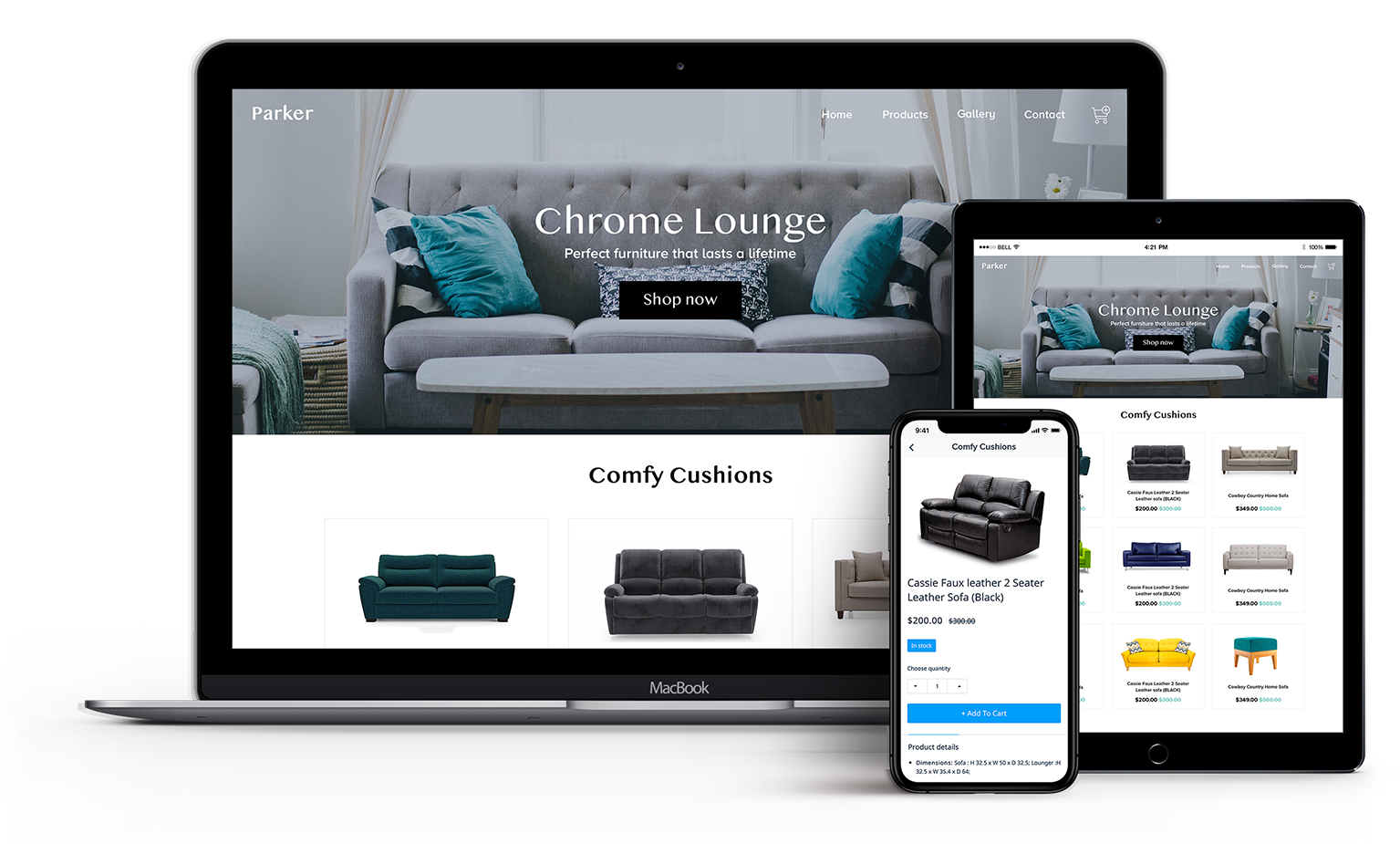
Zoho Commerce ensures that all the templates are optimized for different devices. Also, most templates can be modified to suit any business type as most features of the templates are customizable.
Products and categories
Product management is where the core functionality of an ecommerce platform resides. For starters, you should check how many products an ecommerce platform allows you to list. While some platforms allow an unlimited number, others have a cap. You should avoid paying a fee for additional product listings. Having the ability to map products into categories allows you to create an organized hierarchy and make it easy for online shoppers to navigate and search for items.
An ecommerce platform should allow you to create pages that attract customers and increase the likelihood of checkout. Features such as product attribute that let you maintain product variations are must-haves for some businesses, like fashion, but not so much for others. Another potentially essential feature is the ability to optimize image clarity with speed. If the customer can't properly see what they're buying, or the website loads too slow, they're not going to buy!
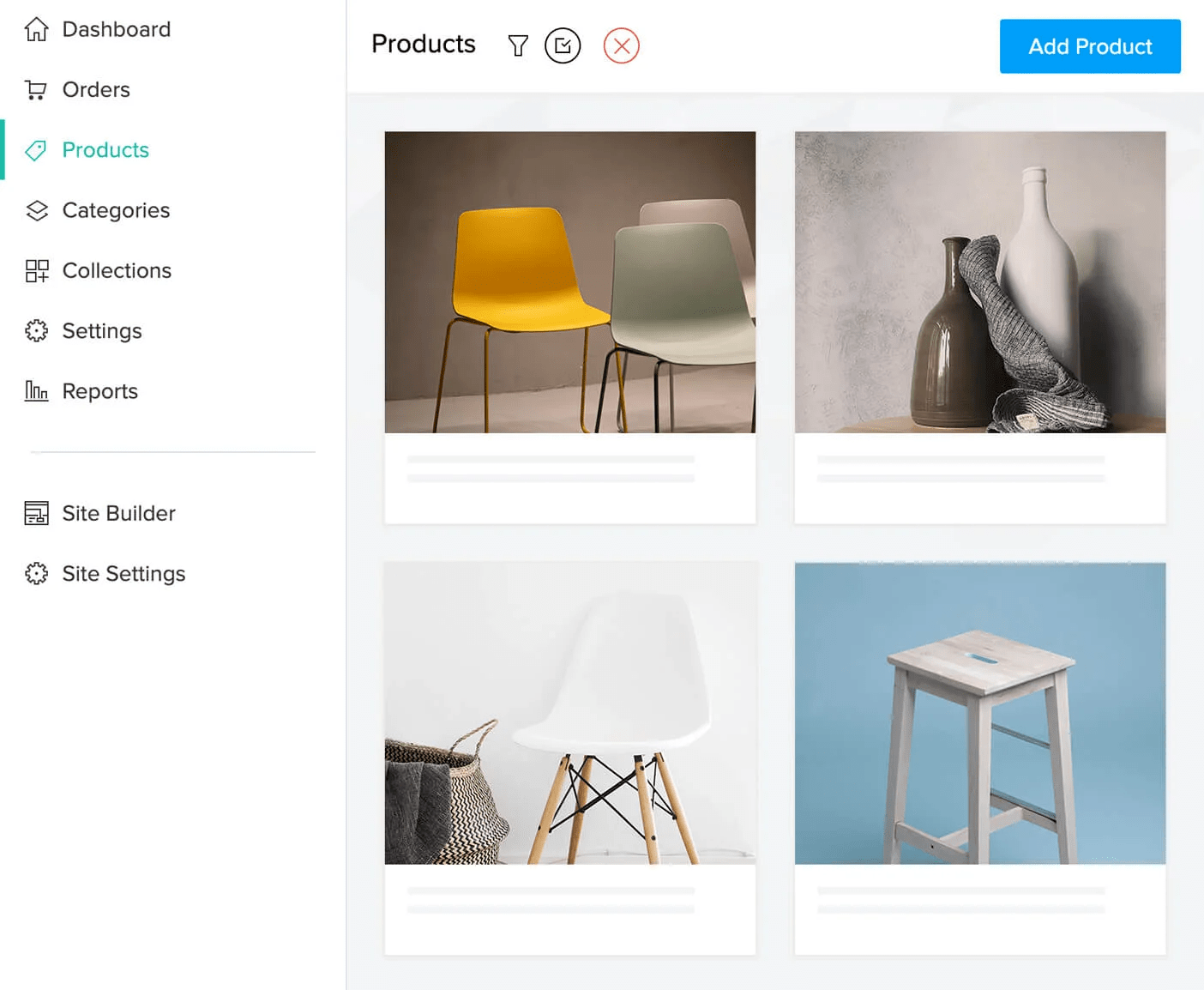
Zoho Commerce can help you arrange your products just the way you wish them to be arranged. To make it easier for your customers to browse, we have created Categories and Collections within the product. This way segregating and arranging different products based on different parameters would not be a problem.
Administration
Your command center is going to see a lot of action. What's in stock, what's running low and needs to be re-ordered, what's not available any longer and cannot be shown as available for purchase—all these are decisions your ecommerce platform should be able to automate to a large degree. Imagine the frustration of a customer who spends time and energy choosing you over your competition and buys from you, only to realize that the product is not in stock and they'll have to cancel their order!
Another part of administration is managing returns. Is a specific product eligible for a return? What are the conditions for it? What is the time limit? Will the refund be full or partial or only a product exchange? Automating this function is going to build credibility with your customers.
Many business owners pay attention to the website design but forget that the backend is where their own employees have to operate everyday. If the interface is clunky or complicated, your administrators will lose themselves in a labyrinth and waste time on tactics rather than focusing on revenue-generating activities. So ensure the backend interface is simple and intuitive to use. You're also likely to have (or need) systems such as a CRM, so choose an ecommerce platform that seamlessly integrates with them.
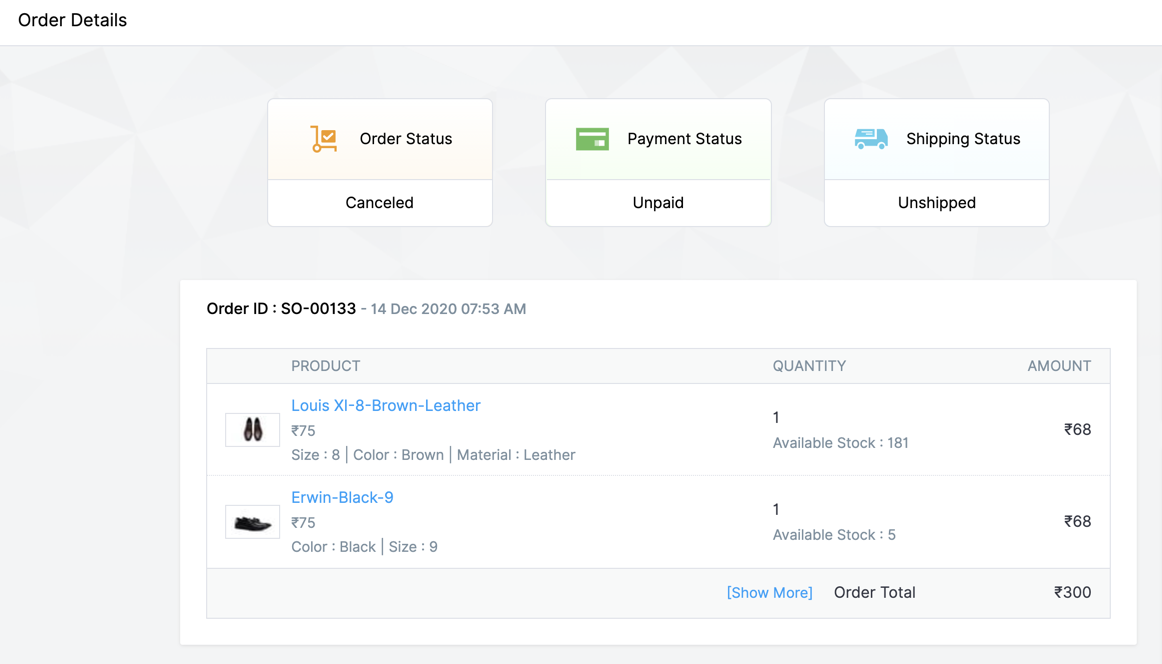
As merchants, within Zoho Commerce, you have access to live order status. You can also cancel orders due to any reason from the backend. If you are a customer, you can cancel the complete order or even a partial order. Learn more about our Member Portal feature through this blog.
Marketing, SEO, and omni-channel capabilities
Ecommerce platforms take advantage of technology to extend marketing capabilities to businesses. From allowing you to run targeted promotions to the bundling of products to giving customers a space to review products, these features are built into the platform to aid your business development activities.
SEO is all the rage in marketing for a good reason—the higher you rank in search results, the higher the chance of discovery. And obviously you need shoppers to find your store when they're searching online for products. Having your own unique domain name, a Google sitemap, and meta-information for products are all necessary ingredients for improving search engine rankings. Some platforms will let you run a blog that gives you a more dynamic and conversational approach to engaging your customers.
Another plus is having omnichannel capabilities. It can be too much work to manage your business on multiple channels such as Amazon, eBay, or Etsy, and your own website. With multi-channel marketplace extensions, an ecommerce platform will let you manage everything from one place, centralize all the data, and draw channel-specific insights.
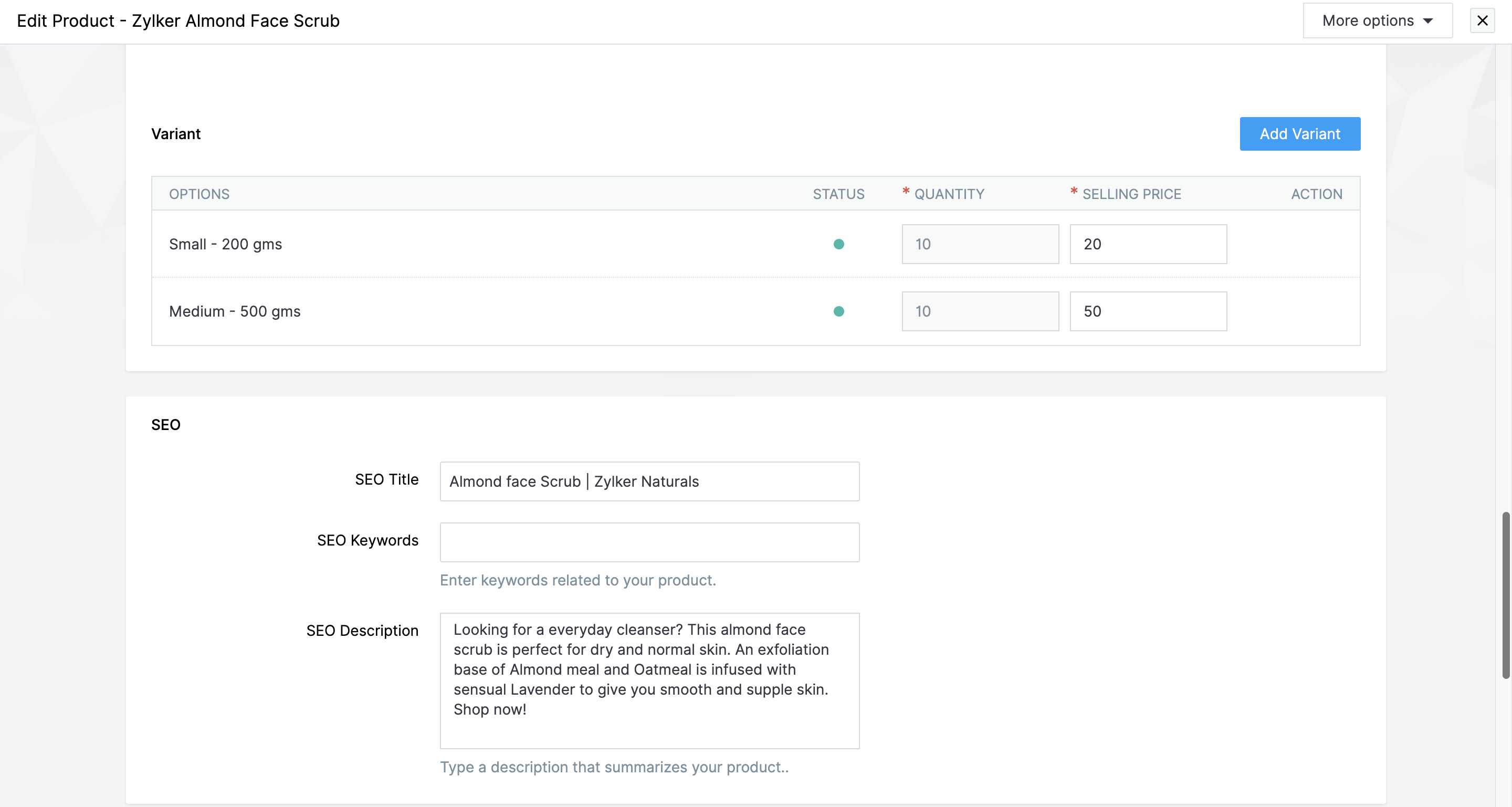
Zoho Commerce comes with an inbuilt SEO section. All you need to do is provide appropriate keywords related to your products just to make sure that each product gets ranked individually for SEO.
Tip: Zoho Inventory is the platform of choice for Zoho Commerce users for inventory and channel management.
IT, hosting, and security
A major factor in business success is having a secure infrastructure. Customers may hesitate to buy if their payment-related information appears insecure, not to mention all the legal trouble a breach would invite for you. PCI-DSS-compliant payment solutions—a standard for secure payment processors such as PayPal and Stripe—offer security, and your platform should integrate with them. You must also confirm that the platform supports HTTPs or SSL to secure customer data and prevent breaches.
Your website's performance will decide whether a customer will conduct a transaction on your site. A poorly hosted website will not do well in search rankings, and slow loading times will surely mean losing a customer to a competitor. You also want your ecommerce website to be able to handle a high volume of traffic. Frequent backups of your site will keep things under control just in case there is ever any technical hiccup.
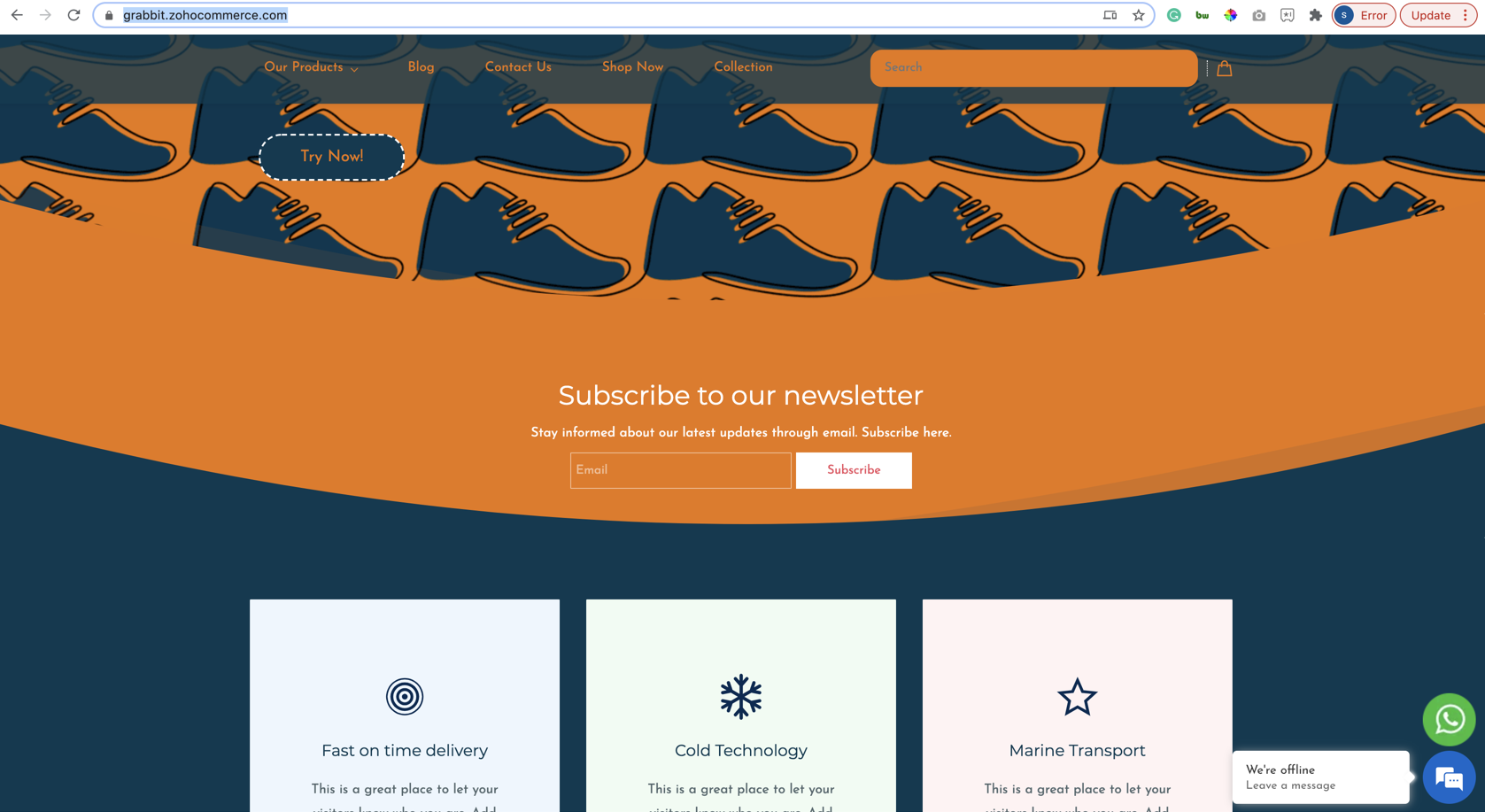
Zoho Commerce you can get free sub-domains if you don't own a domain. Also every store hosted by us, will be provided with free SSL security certificates. Other hosting providers choose to charge an extra annual fee for the same. Learn more about our SSL security here. A green padlock is essential for your customers to trust your website enough to make payments.
Support and services
When it comes to SaaS platforms, most features are available out-of-the-box for you to implement, and the learning curve is not steep. Still, there will be occasions when you will need to talk to support to figure out some technicality. You should determine the support the ecommerce platform vendor provides. Do they have a channel with 24/7 assistance? Can they be reached via email, phone, and chat? How quickly do they respond to you? Does the vendor provide worldwide support, and are they active in your region?
Besides these questions, look at what services the ecommerce platform vendor provides for training and educating your team. Some of them have guides and videos to walk you through the setup process, while others will even give you live training if you need it.
Zoho Commerce provides integration with SalesIQ which allows you to set up chat support for your customers. This way they can always feel free to reach out to you with a single click. SalesIQ also makes use of AI assistants which will help you to manage customers while you are offline.
Vendor expertise
Not every platform is right for every business. This is where the platform vendor's expertise is going to come into play. Depending on their client base, different ecommerce platform providers build various features. When evaluating a platform, ask yourself whether it's largely for a commercial business owner, smaller merchants, or hobbyists. Can the vendor meet your needs and respond to the complexities of your business? Does their platform support other businesses in your industry? Research case studies and customer testimonials, often available on the vendor's website, to understand how others have benefited from that specific platform.
Zoho Commerce is capable of catering to any ecommerce business big or small. Our plans are designed to create and provide for the individual needs of any business. Take a deep dive into our features to help you understand better.
Plan your budget
Now that the list of features you need to run your online business is ready, it's time to solve the problem of affordability. Consider these four types of costs:
Platform costs: Will you be paying a flat monthly/annual fee, or will there be additional costs for transactions, server space, and plug-ins beyond the sticker price?
Design costs: Can you design and get the website live on your own, or do you need to hire someone? Unless you need to customize the template for your website, SaaS ecommerce platforms let you set up a website without any technical knowledge.
Maintenance costs: If you opt for a traditional or open-source platform, the maintenance costs fall on you, and you will require technical assistance. With SaaS platforms that charge a fixed monthly or annual fee, maintenance costs are already covered.
Upgrade costs: With changing customer behavior, you'll need new features. How does a vendor implement improvements/upgrades? Some ecommerce platforms need frequent manual updates for each component, which adds to your costs. For others, upgrades are a part of the package.
With Zoho Commerce, there is just a platform cost that you pay monthly for using our platform. Other than that you wouldn't be paying anything to us unless you cross the threshold value of sales. Learn more about our pricing plan to come to a conclusion as to why you need to start using us.
Time to market
How quickly can you get your store live? That's the question you'll be burning to ask by the end of this evaluation. The reality is it can take anywhere from just a few hours to even months, depending on whether you are implementing a SaaS-based ecommerce platform (best suited for those who want to focus on business development and not get lost in the complications of website development) or building one from scratch with a team of developers.
For instance, with Zoho Commerce, you can get yourself on-board in the next 60 minutes!
Do the research and choose wisely
An ecommerce platform will be the backbone of your ecommerce business, and you have a lot riding on it. The last thing you need is for it to crash like a house of cards because it was the holiday shopping season or hackers managed to get in. So do your research and don't buy based only on hearsay. Make sure you are paying for features you will actually use. And, of course, after all the effort you put into designing your online storefront to convert traffic into sales, you'll want to ensure your site and operations are up and running all the time.
The best way to understand what any platform has to offer is to get in touch with the sales rep and ask them a lot of questions. They are in the best position to share your strategic vision and tell you how their platform can take your business places online.
Commerce Insights is a blog maintained by Zoho Commerce for ecommerce merchants. We discuss topics relating to product features, getting started with ecommerce, and marketing ideas for businesses.
We want you to be a part of this journey in building an ecommerce community. Please send us your thoughts, suggestions, and ideas at marketing@zohocommerce.com.
If you wish to publish an article on the platform, please send it to the same email.
For support-related queries, please write to support@zohocommerce.com.
